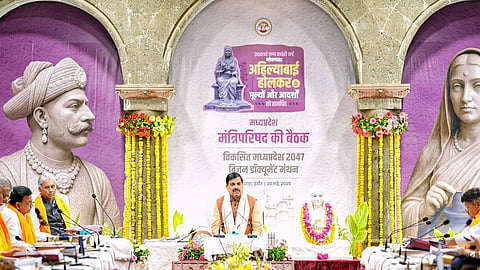

BHOPAL: The special state cabinet meeting held at Indore’s historic Rajwada Fort on Tuesday approved the Rahveer Scheme under which Rs 25,000 will be paid as reward to each of rahgeers (passerby) who timely rush accident victims to hospitals or other health facilities.
"To qualify under the scheme, the person must stop at the accident site, then dial for a 108 ambulance immediately and actively assist in transporting the injured person to the hospital/PHC/CHC," the urban development and housing minister Kailash Vijayvargiya said while briefing journalists about the major decisions taken at the meeting which was held at the Ganesh Hall of the historic palace located in the heart of Indore.
He added that this scheme, once actualised, will help save countless lives. He also noted that the person taking action to save a life will be protected from unnecessary questioning by the police.
As per government data, Madhya Pradesh reported 54,432 road accidents in 2022, ranking it second nationally in terms of such accidents.
The cabinet meeting also approved development projects and schemes worth Rs 3867 crore, including the in-principle approval to the Lokmata Devi Ahilyabai Holkar Training Scheme, aimed at providing employment-oriented skill development to state’s youth.
Under the scheme, eligible individuals will receive an annual interest subsidy of Rs 1,000, with a lifetime cap of Rs 10,000 per person on loan interest. The scheme will entail an annual expenditure of approximately Rs 100 crore.
Aiming to enhance women’s participation in the workforce in industrial areas by ensuring their safety and security through proper housing facilities, the cabinet approved construction of 26 working women hostels with total capacity of 5572 beds across four industrial areas/zones, among them Vikram Udyogpuri (Ujjain), Pithampur Industrial Area Sectors 1&2 (Dhar), Malanpur-Ghirongi (Bhind) and Mandideep (Raisen). A sum of Rs 249 crore-plus has been allocated for the hostels in four industrial areas.
To be built by the MP Industrial Development Corporation (MPIDC) with central assistance under the “Special assistance to states for capital investment 2024-25” scheme, the hostels will include modern amenities like parking, food courts, recreational spaces, and crèches for children.
“We’re starting by building working women hostels in these four industrial areas, efforts will be made in future to encourage industries to come up with similar hostels through the CSR fund money. Public Private Partnership (PPP) mode will also be explored in future for building such hostels, which will help in enhancing women participation in the industrial workforce in MP,” Vijayvargiya said.
The meeting chaired by CM Dr Mohan Yadav also approved the Madhya Pradesh Metropolitan Region Planning and Development Act, 2025, which will enable the formation of Metropolitan Planning Committees and Metropolitan Region Development Authorities.
Two major regions identified for this are: Indore-Ujjain-Dewas-Dhar and Bhopal-Sehore-Raisen-Vidisha-Biaora (Rajgarh). These authorities will prepare and implement integrated development plans tailored to the geographic and economic needs of each metropolitan area for the next 25 years.
Importantly, the CM had earlier announced the formation of “Metropolitan Planning Committees” and “Metropolitan Region Development Authorities” in accordance with the provisions of the Indian Constitution. This move aims to ensure integrated regional development of urban areas in the state with populations exceeding 10 lakh.
Under this framework, the Metropolitan Region Development Authority will prepare a draft development plan for the designated metropolitan region. This draft will be submitted to the Metropolitan Planning Committee for approval and then forwarded to the State Government for final sanction. Once approved, the development plan will be implemented by the respective Metropolitan Region Development Authority.
The development plan will be tailored to the specific geographic and infrastructural needs of each metropolitan area. It will encompass sectors such as education, industry, and healthcare—ultimately facilitating employment generation and economic growth in the region.